If, back in 2013, shortly after the premiere of MAN OF STEEL, you told DC fans that a Blue Beetle movie would be in theaters within a decade, you have to think they would have been ecstatic. After all, if WB decided to mine such an obscure character, surely it meant the DCEU was hitting its stride, much like Marvel did when it launched the likes of GUARDIANS OF THE GALAXY and ANT-MAN. A Blue Beetle movie should have reflected a success of a similar magnitude. Instead, it’s 2023 and Ángel Manuel Soto’s film is arriving as a bit of an afterthought because the DCEU descended into utter chaos before it ever truly got started. I’m not here to assign blame or dissect the questionable decisions that got it to this point, but the bottom line is that BLUE BEETLE is bowing in theaters with all the fanfare of one of the last runners in a marathon wheezing to the finish line. Instead of a victory lap, it’s the last leg of a relay race where the baton is the Sword of Damocles.
And it’s a total bummer because BLUE BEETLE is one of the best DC productions during the past decade.
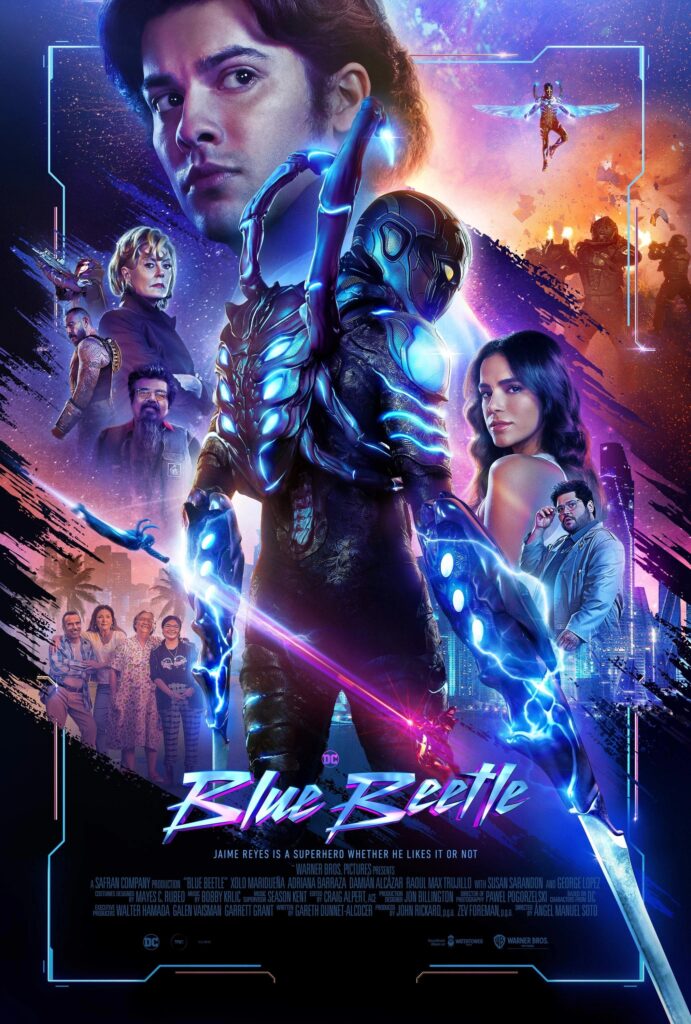
Like ANT-MAN, it takes the legacy route by alluding to Ted Kord and the Blue Beetle lore during the opening credits. The long and short of it is that Kord — an eccentric billionaire and owner of Kord Industries — masqueraded as the Blue Beetle after stumbling upon the Scarab, an alien artifact that bestows nano-tech superpowers to those who harness it. However, both he and the Scarab mysteriously disappeared, leaving the company in the hands of Kord’s sister Victoria (Susan Sarandon). Under her watch, Kord Industries operates under two imperatives: profit at all costs and recover the missing Scarab. After years of searching, one of Victoria’s teams uncovers the artifact in Antarctica, and she immediately sets her sights on developing a new breed of super-soldier with the technology. Standing in her way is her niece Jenny (Bruna Marquezine), who swipes the Scarab in order to preserve her father’s legacy. During her escape, she hands it off to Jaime Reyes (Xolo Maridueña), a recent college graduate hoping to land a job at Kord Industries to help his family out of their dire financial straits. Despite being explicitly warned not to investigate the Scarab, Jaime and his family let their curiosity get the best of him and the artifact attaches to him, granting him newfound abilities (which rules) while making his body an unwitting host (not great!).
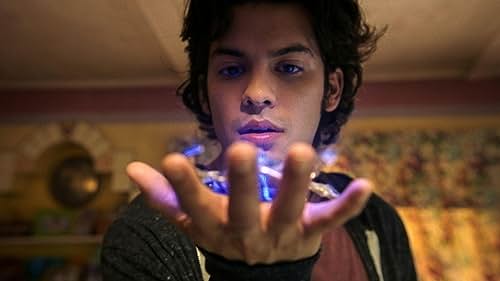
Narratively and formally, BLUE BEETLE does not break new ground. In fact, it’s sort of ironic: it turns out the best way to make a DCEU movie is to just make an MCU movie. This isn’t snark, nor is it exactly a criticism — imitation is the sincerest form of flattery, and, in this case, it’s better than most of the productions that were so desperately trying to cut a bold, new path. Usually, misguided ambition is preferable to safe, formulaic filmmaking, but BLUE BEETLE makes a strong case for simply playing the hits. Just about everything that’s endeared MCU productions to the masses reports for duty: relatable characters, quippy dialogue, and spectacle filmmaking that’s functional enough but leaves you wanting something a little more aesthetically substantial. I don’t know if there’s a memorable camera move or stylistic flourish that emerges from the parade of CGI-driven action sequences, but it’s become increasingly apparent that this is just how these things mostly go these days. It’s not that BLUE BEETLE doesn’t have its moments — it’s just that most of them involve punchlines instead of punching.
Which, to be fair, isn’t the worst approach. If there’s one thing that the MCU has done, it’s reveled in its fondness for its own characters without slipping into fawning reverence, and BLUE BEETLE strikes that same balance. Like all comic book characters, there’s an inherent silliness to the premise, and the film neither shies away from it, nor does it slip into farcical irreverence. It’s once again that familiar blend of humor and heart that ultimately makes this outing worthwhile, as Jaime and his underdog family are an endearing bunch with very human (and all too commonplace) foibles and struggles. Despite facing economic hardships, the Reyes family are eternal optimists who believe in the American Dream. In fact, Jaime himself is living proof as the first of the family to graduate from college, and, even though that doesn’t immediately unlock any doors for him, they’re proud of the accomplishment itself.
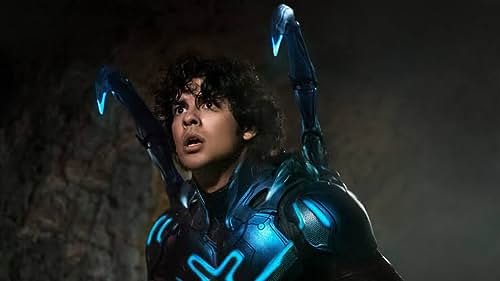
They’re just good people, and Jaimie especially is immediately captivating thanks to Maridueña’s incredible charisma and screen presence. Between this and COBRA KAI, it’s clear that he’s got that “it” factor that’s going to make him a star for years to come. He’s effortlessly charming here in what’s essentially a Peter Parker role: a boyish dork who’s way over his head but still embraces his unexpected destiny with a certain aloofness. His chemistry with Marquezine is also a delight, and I love that she’s allowed to hold her own as Jenny — in many ways, this is just as much her story as it is Jaime’s as she grapples with her family’s legacy.
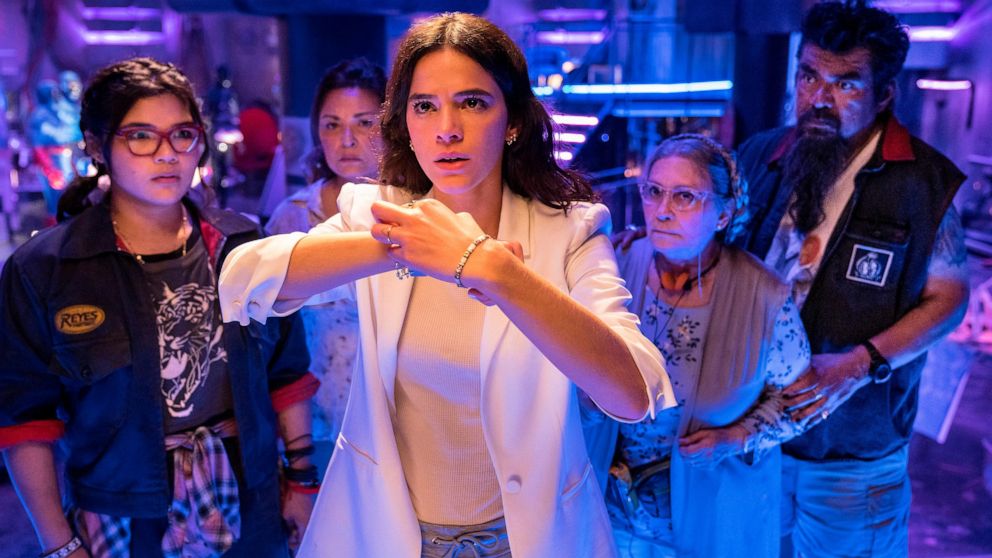
George Lopez is rightfully going to garner a lot of praise for his raucous turn as Rudy, Jaimie’s paranoid, conspiracy-theorist uncle who also happens to be a tech whiz. He gets most of the film’s best dialogue but finds a way to soften a character archetype that raises a lot of red flags these days. Mostly, Rudy feels like a throwback to the ’90s, when conspiracy theorists were just kooky hobbyists instead of full-fledged maniacs who harass people on Twitter (but I digress). He’s certainly a lot of fun and brings a boisterous spark to the proceedings, but it’s just as important that he’s counterbalanced by Jaimie’s parents, who are undoubtedly the film’s heart and soul.
Damián Alcázar is especially wonderful as Jaimie’s father Alberto, a proud man who risked life and limb to give his family a fighting chance at prosperity, only to see the rich get richer instead. Soto entrusts him with the film’s most pivotal emotional scene, and he delivers — if there’s any doubt that BLUE BEETLE is working, they’re erased during this climactic turning point, which cements it as a touching film about family. Eat your heart out, FAST AND FURIOUS. I would also be remiss if I didn’t mention Adriana Barraza’s turn as Jaime’s grandma, whose revolutionary past inspires a couple of fun gags down the stretch, and Belissa Escobedo as Milargo, Jamie’s smartass sister. And it’s not that everyone has their own moment to shine (and they most certainly do) — it’s the way Soto invests in the absolute purity of this family dynamic that gives BLUE BEETLE its purpose. This is the umpteenth time we’ve watched some scrappy underdogs overcome the odds to topple some megalomaniacal villain hellbent on world domination, but this one is more concerned with the smaller, more intimate stakes of the story.
Sarandon’s Victoria has those lofty ambitions, but Soto dwells on the destruction she weaves through both the Reyes family and her own henchman OMAC (Raoul Max Trujillo). She’s truly despicable, and Sarandon’s quirky, vampish approach to the character underscores the ruthlessness of Victoria’s cutthroat approach to reducing everything to capital, revealing a particular kind of scourge that’s currently terrorizing the world: a CEO who’s obsessed with turning something they can’t understand or control into intellectual property. The ironic parallels between this and the struggles of the DCEU are hard to miss, as we’ve seen that particular property pass and slip through many different hands now.
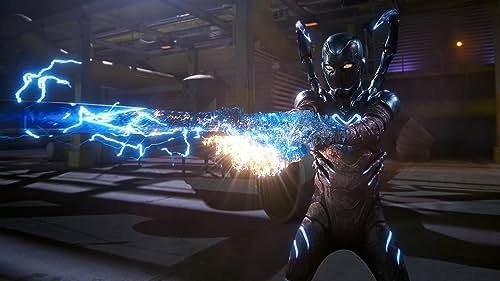
Maybe James Gunn will finally figure this all out. If so, he would be wise to fold BLUE BEETLE into whatever plans he has going forward. While I doubt this character will ever be the cornerstone of whatever comes next, Soto and company have certainly earned the right to see their vision of a trilogy play out. I’m particularly impressed by the balance that’s struck here: obviously, this is the stuff of fantasy, but it’s grounded in a human element that it refuses to shy away from. Unlike most of its contemporaries, BLUE BEETLE doesn’t allow the fantasy to become a metaphorical salve for the real-life, institutional socio-economic conflicts that underpin it.
I’m thinking especially of how this year’s ANT-MAN: QUANTUMANIA dared to broach the topic of underprivileged communities and income inequality on Earth before jetting off to another dimension to tackle the subject allegorically with monsters and aliens — and never coming back around to resolving the actual problems plaguing the real world. It’s the sort of escapist fantasy that unwittingly confronts the fact that these heroes can save the world from otherworldly threats but apparently can’t do much to solve institutionalized violence and inequality. At the very least, BLUE BEETLE sees this through, which is why its most triumphant moments involve radical displays of empathy (Trujillo’s journey from one-note henchman to fully realized human being is remarkable) and community building. Jaimie’s newfound powers might save the world from a corporatist nightmare, but the film acknowledges that it’ll take more than that to turn the tide of gentrification plaguing Palmera City, a fictional location whose visible inequalities feel strikingly real.
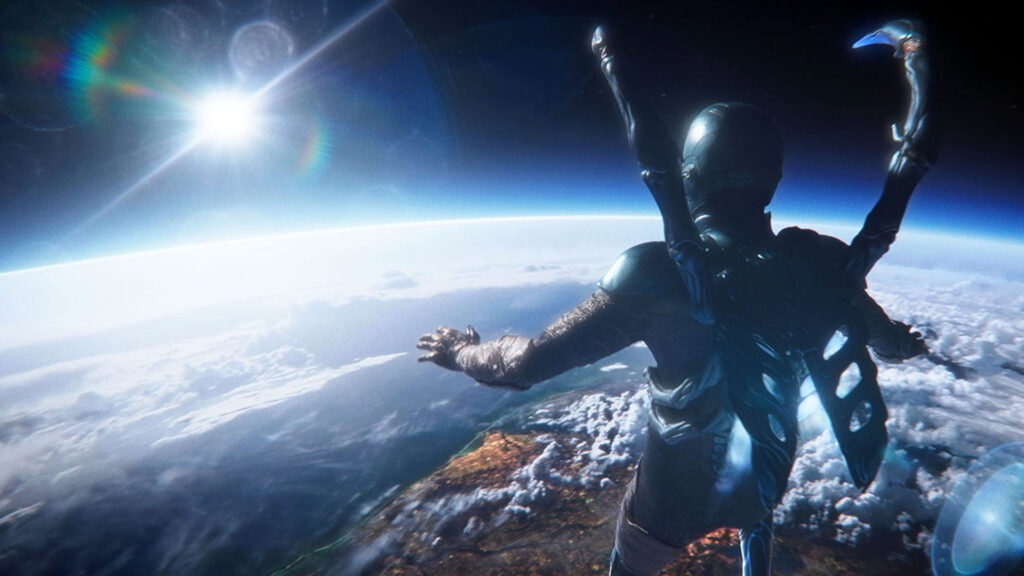
And while Soto still indulges in escapist fantasy to realize his mega-happy ending, BLUE BEETLE resonates on that intimate, human level because it’s nice to see good things happen to good people. Ultimately, this is why the superhero mythos — which is just a descendant of ancient hero mythos — endures within the pop culture consciousness: to reinforce our need for truth and justice. Once upon a time, we also included “the American way,” but BLUE BEETLE suggests there’s still some work to do before that phrase earns such a distinction. But it does believe that work can be done, and that optimism makes it a worthy entry into the superhero canon, familiarity and DCEU hand-wringing be damned.
Tags: Adriana Barraza, Ángel Manuel Soto, Becky G, Belissa Escobedo, Bobby Krlic, Bruna Marquezine, Comic Books, Craig Alpert, Damián Alcázar, DC Comics, Elpidia Carrillo, Gareth Dunnet-Alcocer, George Lopez, Harvey Guillén, Pawel Pogorzelski, Raoul Max Trujillo, Superheroes, Susan Sarandon, The Haxan Cloak

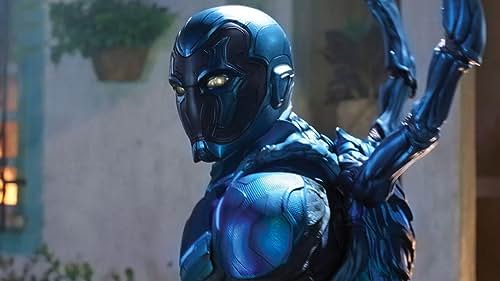

No Comments